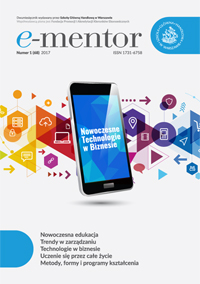Wykorzystanie metafor w identyfikacji i kształtowaniu postaw przedsiębiorczych
The use of metaphors in the diagnosis and development of entrepreneurial attitudes
Author(s): Beata Krawczyk-Bryłka, Katarzyna StankiewiczSubject(s): Cognitive Psychology, Developmental Psychology, Organizational Psychology, Social development
Published by: Szkoła Główna Handlowa w Warszawie, Fundacja Promocji i Akredytacji Kierunków Ekonomicznych
Summary/Abstract: Students’ attitudes towards entrepreneurship are an important issue in entrepreneurial education. They include cognitive, emotional and behavioral aspects that influence students’ willingness to start their own business. Diagnosis of students’entrepreneurial attitudes is crucial for the preparation of appropriate training programmes. In this paper, some commonly used proverbs and phrases (referred to as metaphors) are proposed as a diagnostic method for the assessment of entrepreneurial attitudes and as a pragmatic method that can be used to form proactive entrepreneurial attitudes.The aim of the study was to verify that entrepreneurial metaphors described in the literature are up to date and to identify current metaphors pertaining to running a new business as perceived by business students. The authors’ original questionnaire was used to evaluate the accuracy of known metaphors (4-point Likert’s scale) and to identify student’s own metaphors. Statistical analysis of obtained results (thet-Student test for one group was used) showed that the most accurate metaphors related to entrepreneurship were related to its perception as a management process,hard work, overcoming obstacles and competition. Analysis of metaphors created by the respondents allowed to identify three dominant categories of entrepreneurial activities: overcoming obstacles and barriers, taking risk in uncertain environment and proactivity understood as responsibility for the new venture development. The research resulted in a catalogue of current entrepreneurship metaphors and in the list of recommendations for entrepreneurial education. We also presented an example of the such usage in practice.
Journal: e-mentor
- Issue Year: 68/2017
- Issue No: 1
- Page Range: 42-47
- Page Count: 6
- Language: Polish

